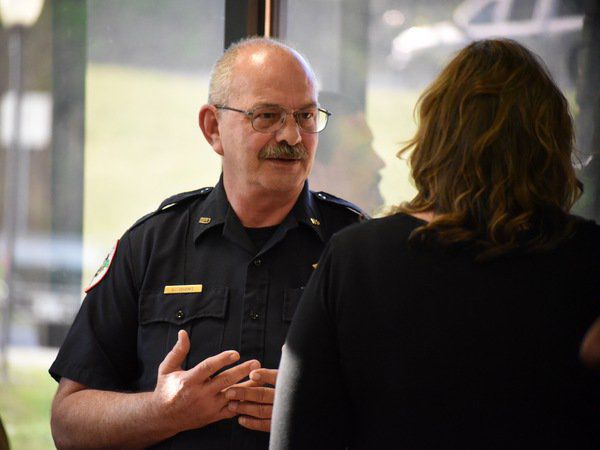Varnell council members want more information before making decision on Grant
Published 7:30 am Wednesday, April 10, 2019

- Matt Hamilton/Daily Citizen-NewsVarnell Police Chief Lyle Grant chats at Varnell City Hall on Tuesday night.
VARNELL, Ga. — Varnell Police Chief Lyle Grant could learn soon whether he will face criminal charges for giving an encrypted portable radio that Whitfield County owned to a local wrecker service.
District Attorney Bert Poston said Tuesday afternoon in an email that he had received the results of a Georgia Bureau of Investigation (GBI) investigation of Grant for possible felony theft by conversion and reckless conduct but had not yet reviewed it.
“I am concerned,” Grant said Tuesday night after a meeting of the Varnell City Council. “But anything I did I did to benefit the city of Varnell.”
The Whitfield County Sheriff’s Office referred the case to the GBI in March.
“It is standard protocol to turn over a case to GBI when the case involves another law enforcement agency/officer,” Sheriff’s Office Capt. Paul Woods said Tuesday in an email.
In March, the sheriff’s office said in a statement, “The sheriff’s office initiated an investigation after recovering an encrypted portable radio which contained numerous frequencies that were being used throughout the county. It was determined shortly after starting the investigation that criminal charges could arise from this incident, therefore the case was turned over to the GBI to investigate.”
Grant provided an encrypted police radio to Bob Cummings, owner of Bob’s Wrecker Service in Dalton. Grant told a reporter in March that Bob’s is the only towing service that applied to be on Varnell’s rotation this year to be called when wrecks occur.
A case summary in the incident report said there was “a potential for criminal violations” to have been committed.
It mentions the possibility of reckless conduct “due to Chief Grant providing an encrypted police radio to a private citizen and his employees to use and disregarding the potential safety risks to law enforcement officers engaged in undercover/sting/narcotics operations. A private citizen, his employees and customers could be privy to and monitor sensitive law enforcement operations such as ‘buy busts,’ undercover drug operations and search warrant executions in real time on encrypted channels, (posing) a substantial and unjustifiable risk to law enforcement (officers’) safety.”
It discusses theft by conversion “due to Chief Grant converting Whitfield County-owned property to private use when he knowingly and willfully gave/loaned the radio to Robert Cummings to use in his private business.”
According to the report, on March 25 “a confidential source” made the sheriff’s office aware that “an encrypted police radio was being used by Bob’s Wrecker Service.” Each radio cost the county approximately $5,500, according to the report.
Later that day, deputies went to Bob’s Wrecker Service and met with Cummings. “When detectives entered the business, a dispatcher could be heard on the radio,” the report states.
“Cummings stated that he did have a police radio in his possession,” according to the report. “Cummings went on to state that prior to the new digital radio system, he had multiple radios that were used to monitor the radio. The radio networks were not secure and the public could listen to everyday radio traffic. Cummings stated that when the digital radio system went online, he was having to pay one of his employees to stay at the office and monitor the phone calls coming in. Cummings asked Varnell Police Chief Lyle Grant if he could obtain an encrypted radio to use and Chief Grant agreed.”
The deputies took the radio. The report said that on the way back to the jail, a deputy went through the channels and noted that “a large majority of encrypted channels were open and could be monitored by whoever had possession of the portable radio.”
The report notes that Whitfield County purchased the radios with proceeds from a Special Purpose Local Option Sales Tax and allowed the city of Varnell to use some of the radios, only requiring the city to pay annual maintenance fees.
Poston said Tuesday it wasn’t unusual for a law enforcement agency to consult his office before deciding whether or not to ask for an arrest warrant.
“There are a lot of cases where warrants aren’t taken until the (district attorney’s office) is consulted or the cases are taken to grand jury for indictment and then a warrant issued off the indictment,” he said. “It’s more common to take the warrant first, but not at all unusual to do it later. Many of our child-victim and sex-crime cases are done that way because we want to make sure we have a solid case before we publicly charge someone with such a serious offense. If we take a warrant too soon, and then dismiss it later, the individual’s reputation can be destroyed forever. Most of my vehicular homicide cases are done by indictment warrant after the (Georgia State Patrol Specialized Collision Reconstruction Team) finishes their investigation and brings it to me for review.”
Poston did not immediately respond to an email asking why this case has been handled that way. An aide said he had already left the office for the day.





